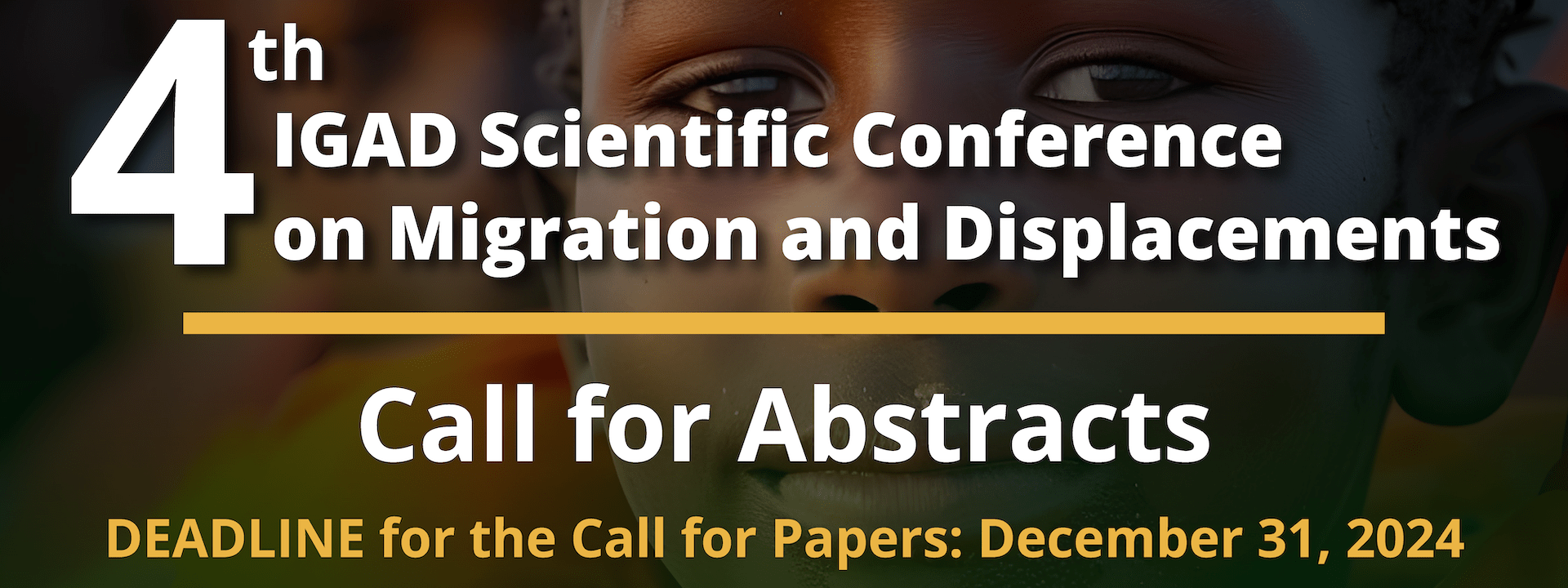Sub Theme One: Drivers and Root Causes
This sub-theme includes topics that cover mobility motivation, aspirations of migrants and displaced populations that inform movement into, within and between cities and urban areas. In this sub theme papers are expected on mobility intentions, motivations, and aspirations; social cohesion between migrants/displaced populations and urban residence/host communities; development-induced displacement in the context of urban renewal and infrastructural development. Contributions here also may cater on movement trends and patterns like rural-urban migration, routes in migration in the region, and historical trends and patterns that can inform future decisions on settlement
in urban areas. In addition to the above studies on theoretical perspectives that can inform the factors behind migration; connectivity, transportation and networks as drivers of migration; climate change and conflicts including the impact of migration on the environment; migration linked with geographical and economic inequalities/migration, displacement, and inequalities in urban settings; enabling policies as a pull factor; and the influence of heterogeneous (cosmopolitan) versus homogenous population movements on sustainable integration are welcome.
Sub Theme 2: Urban Governance and Policy
This sub-theme focuses on promoting greater access to rights and meaningful participation among migrants and displaced populations in cities and urban areas (effectiveness, meaningful participation, inclusivity, accountability and coherence of policy processes and outcomes). It also includes access to human rights (work, movement, documentation etc.), protection, prevention of exploitative environment; decision-making rules and processes; accountability and transparency; inclusivity – gender, disability, age, minority groups; disaster risk reduction/Early Warning and Early Action (EWEA); planning and resource allocation decisions such as city master planning processes; alignment among
regional and national policy and legal frameworks with urban policy and legal frameworks that may include elements of regional integration; urban governance, legal frameworks on social services; integration, social networks – strategies for integrating migrants and social cohesion; peacebuilding, security and securitization; gender in migration and development; gap between discourse and practice and the coherence and incoherence of policy, legal and institutional frameworks.
Sub Theme 3: Socio-Economic Integration
This sub-theme focuses on enhancing access to resources to promote productive capacities and self-reliance of migrants and displacement-affected communities, urbanization and social cohesion. The sub theme also addresses issues around coping mechanisms and adaptations of migrants and displaced individuals and communities in urban settings; social cohesion; access to basic services and social protection; social networks; participation; housing, land, and property; livelihood opportunities including.
Sub Theme 4: Financing, Investment and Innovation
The focus of this sub-theme are expanding city resources to improve the production of socio-economic goods for city dwellers including migrants and displacement-affected communities. This sub-theme intends to further explore resourcing – national government, own source revenue, development support – to include what resources are available generally for city managers/authorities and the way they are distributed (humanitarian, development etc.) and the effect of power in resourcing decisions (tensions between center and periphery); migrants as producers of economic resources for urban sustainability; diaspora as a source of revenue (role of remittances); leveraging public-private partnerships to enhance production capacity for cities and urban areas; financial flows as drivers of migration; economic corridors and One-Stop Border Posts (OSBPs); proliferation of economic investments (mining, agriculture); ICT development and innovation versus trends and patterns of migration.
Sub Theme 5: Data
The data sub-theme explores the migration and displacement-related data necessary for urban planning. The sub theme focuses on data governance, research approaches and methodologies on urban displacement; co-designing with vulnerable populations; evidence-based policy recommendations; technological advancement and urban displacement (spatial data and visualization, use of geotagging technology, dating apps and social media),exploring unconventional data sources (e.g. social media) to capture migration and displacement patterns and integrating them into urban planning, ownership, availability and quality of data; data management, use and sharing; civil registration and vital statistics; leveraging data for decision-making and behavioral change; informed training to build capacities in local government/city official; and data landscape analysis.

